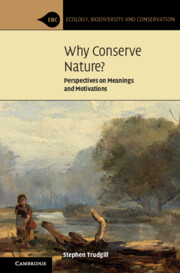Book contents
- Why Conserve Nature?
- Ecology, Biodiversity and Conservation
- Why Conserve Nature?
- Copyright page
- Dedication
- Contents
- Foreword
- Preface
- Part I The Experience of Nature
- Part II Nature Imagined
- Part III Nature, Self and Place
- 5 Personal Meanings of Nature
- 6 Places for Nature
- Part IV Why Conserve Nature?
- Bibliography
- Index
6 - Places for Nature
from Part III - Nature, Self and Place
Published online by Cambridge University Press: 03 February 2022
- Why Conserve Nature?
- Ecology, Biodiversity and Conservation
- Why Conserve Nature?
- Copyright page
- Dedication
- Contents
- Foreword
- Preface
- Part I The Experience of Nature
- Part II Nature Imagined
- Part III Nature, Self and Place
- 5 Personal Meanings of Nature
- 6 Places for Nature
- Part IV Why Conserve Nature?
- Bibliography
- Index
Summary
It seems that there is a decreasing place for nature. World wildlife populations ‘fall by 58% in 40 years’ runs the BBC News headline for 26 October 2016 at www.bbc.co.uk/news/science-environment-37775622. The assessment from the Intergovernmental Science-Policy Platform on Biodiversity and Ecosystem Services (IPBES, meeting 29 April–4 May 2019 in Paris) showed a widespread global loss of habitats and species (UN, 2019: www.un.org/sustainabledevelopment/blog/2019/05/nature-decline-unprecedented-report). The report is the most comprehensive ever completed and draws from scientists and indigenous and local knowledge. Key conclusions are that current efforts to conserve the earth’s resources are likely to fail without radical action and about one million species are at risk of extinction – one in four of the existing species. Crop security is threatened long-term. Marine pollution has increased tenfold since 1980 (https://news.un.org/en/story/2019/05/1037941). Many of these points are also endorsed in the World Wildlife Fund (WWF)’s Living Planet Report 2020: https://livingplanet.panda.org/en-gb. Selected, summarised key points are shown in Box 6.1.
- Type
- Chapter
- Information
- Why Conserve Nature?Perspectives on Meanings and Motivations, pp. 238 - 274Publisher: Cambridge University PressPrint publication year: 2022



